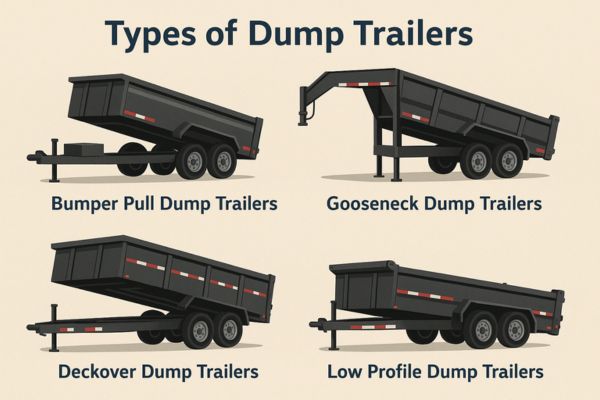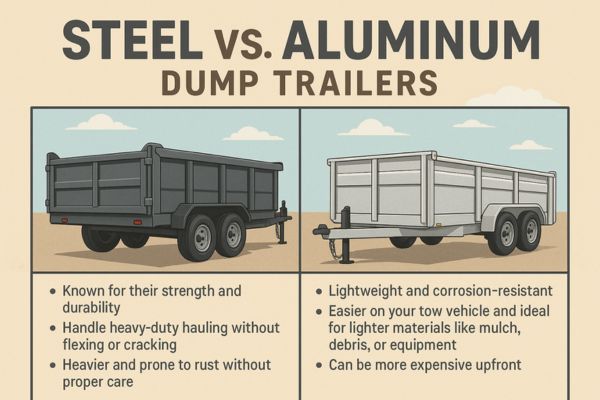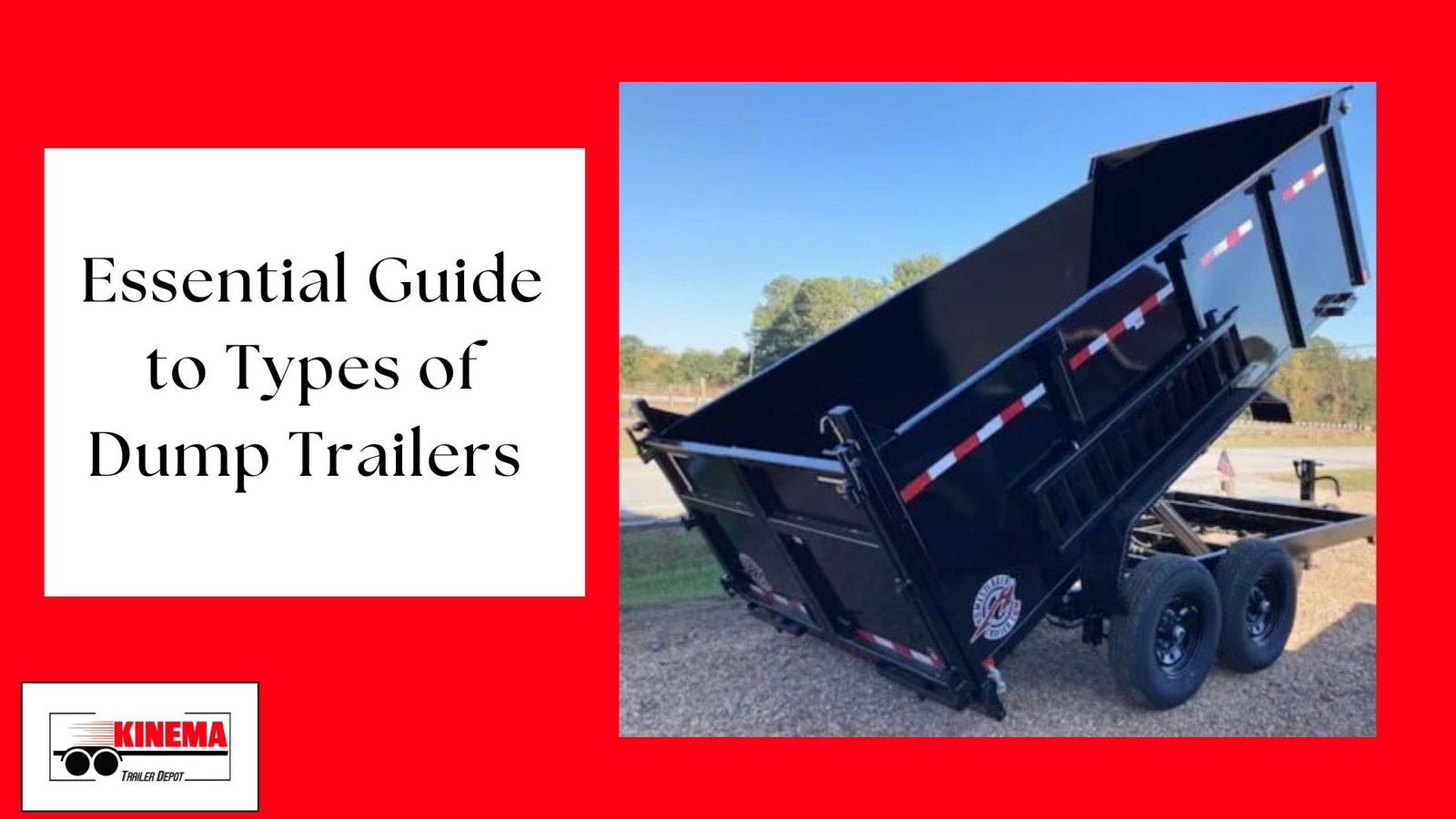Dump trailers may look similar at a glance—but the differences between them can make or break your job performance. Whether you’re a contractor, a farmer, or a weekend DIYer, selecting the right Type of Dump Trailer is essential to haul efficiently and safely.
This guide simplifies your options and helps you understand what features truly matter—like axle type, dump mechanism, material build, and more. From bumper pull models perfect for quick runs to gooseneck dump trailers built for industrial-level jobs, we’re breaking down every type to help you make a smart, cost-effective investment.
What Are Dump Trailers and Why Do They Matter?
At their core, dump trailers are utility trailers with hydraulic lifting systems that tilt the bed for easy unloading. But there’s more to them than just a fancy tilt bed.
The types of Dump Trailers vary significantly in load capacity, construction style, and how they connect to your vehicle. Selecting the right type can significantly impact fuel efficiency, safety, and the lifespan of your trailer. A small landscaping crew might need a low-profile dump trailer, while a farm operation might benefit more from a gooseneck trailer.
Whether you’re hauling gravel, scrap, or soil, the right trailer does more than carry—it works with you.

Bumper Pull Dump Trailers: Compact Yet Mighty
Don’t let the size fool you. Bumper pull dump trailers may be smaller, but they pack a punch. Designed to hitch directly to the rear of your vehicle, they’re a favorite for first-time buyers and small business owners.
This trailer type is great for short-distance hauls and tight turning areas, making it ideal for landscaping, small demolition projects, and hauling mulch or dirt. It’s also one of the most maneuverable types of dump trailers, perfect for navigating busy job sites or residential neighborhoods.
Bonus: They’re often the most affordable option, making them a top pick in any dump trailer buying guide.
Gooseneck Dump Trailers: Heavy-Duty Hauling Power
When your jobs get bigger, your trailer needs to grow with them. Enter the gooseneck dump trailer. Instead of attaching to the rear hitch, this trailer mounts inside your truck bed—creating a stable “fifth wheel” connection.
This design distributes the weight better, reduces sway, and significantly increases payload capacity. If you regularly haul heavy equipment, gravel loads, or construction debris, this is the powerhouse you need. Among all types of dump trailers, this one stands out for its professional-grade capabilities.
Contractors, farmers, and excavation crews often make this their go-to. It’s not just about hauling—it’s about hauling smart
Deckover Dump Trailers: Maximizing Width & Load Volume
Among the many types of dump trailers, the deckover design truly stands out for its extra-wide platform. Unlike standard trailers, the wheels on a deckover are tucked underneath the bed instead of outside it. This gives you a full-width deck—perfect for transporting bulky, oversized materials like pallets, logs, or construction debris.
Deckover dump trailers are especially useful for professionals in construction, agriculture, or demolition. If you’re frequently moving wide or irregular-shaped loads, this design could be a game-changer.
Low Profile Dump Trailers: Lower to the Ground, Easier to Load
Need easier ground access? A low-profile dump trailer may be the solution. These trailers are designed with the bed mounted between the wheels rather than above them, resulting in a lower deck height. This makes manual loading and unloading simpler—and safer.
These are one of the most user-friendly types of dump trailers available, making them ideal for landscapers, homeowners, and weekend warriors. Their design reduces the strain on your back while loading wheelbarrows, hand tools, or light machinery.
They’re a great fit when combined with manual or hydraulic dumping systems, which we’ll explore next.
Hydraulic vs. Manual Dumping Systems: Which Works for You?
One of the most critical decisions when choosing between different types of dump trailers is the method of dumping: manual or hydraulic.
Manual dumping systems are budget-friendly and require no electrical or mechanical components. They work well for small loads or infrequent use. But when you’re moving several tons of material daily, nothing beats the convenience of a hydraulic lift system.
Hydraulic dump trailers use electric pumps or gas-powered engines to raise the bed with minimal effort. This is essential for large-scale contractors or landscapers who need speed and reliability.
Steel vs. Aluminum Dump Trailers: Material Matters
When talking about types of dump trailers, the materials they’re built from play a vital role in performance, maintenance, and longevity.
- Steel trailers are known for their strength and durability. They handle heavy-duty hauling without flexing or cracking. However, they’re heavier and prone to rust without proper care.
- Aluminum trailers are lightweight and corrosion-resistant. They’re easier on your tow vehicle and ideal for lighter materials like mulch, debris, or equipment. But they can be more expensive upfront.
Deciding between steel and aluminum comes down to your work style and budget. If you’re doing rough construction jobs, go steel. For lighter hauling with longer life expectancy, aluminum might be your winner.

Choosing the Right Size: From 5×8 to 7×14 and Beyond
Dump trailers come in all shapes and sizes, but one of the most overlooked parts of any dump trailer buying guide is size selection.
- A 5×8 trailer is ideal for small tasks like yard cleanup or light-duty landscaping.
- A 6×10 or 6×12 offers more capacity while remaining easy to maneuver.
- For heavy-duty projects or commercial work, a 7×14 dump trailer offers the payload capacity and space to handle serious loads.
Choosing the wrong size leads to frequent overloading or wasted space. That’s why understanding the types of dump trailers in relation to size is so essential. Always match the trailer size to your actual hauling needs.
Single Axle vs. Tandem Axle Dump Trailers
One of the most important comparisons when exploring the types of dump trailers is choosing between a single axle and a tandem axle setup.
A single-axle dump trailer has one set of wheels. It’s great for light-duty work, such as hauling debris, mulch, or tools. It’s more affordable and easier to maneuver, especially in tight residential spaces. But keep in mind, it’s limited by its load capacity.
On the flip side, tandem axle dump trailers are built for strength. With two sets of wheels, they handle heavier loads and offer better stability on the road. They’re perfect for contractors or landscapers moving gravel, soil, or equipment across long distances.
Matching the Trailer to Your Tow Vehicle: A Crucial Step
Here’s a commonly skipped but critical factor: matching your trailer to your tow vehicle. No matter how advanced or rugged your trailer is, it’s only as effective as your truck’s towing capacity.
Before buying any of the types of dump trailers, check your truck’s Gross Vehicle Weight Rating (GVWR). If your trailer is too heavy, it won’t just underperform — it becomes dangerous. This is especially true for deckover or tandem axle trailers with higher payload capacities.
You should also consider trailer brakes, tongue weight, and hitch class. These ensure your setup meets legal and safe towing standards.
Understanding Payload vs. Trailer Weight
Another area where buyers often get confused is the difference between payload capacity and trailer weight.
- Trailer weight is the empty weight of the trailer itself.
- Payload capacity is how much cargo the trailer can safely carry.
For example, if your dump trailer weighs 2,000 lbs and its GVWR is 7,000 lbs, the payload capacity is 5,000 lbs. This is where choosing the right types of dump trailers becomes strategic. A larger trailer may not always offer more payload due to its heavier frame.
Overloading a trailer not only risks your safety but can also result in steep fines or damage to your vehicle. Always consult the specs before deciding.
Conclusion: Make the Smart Hauling Choice
Choosing the right trailer isn’t just about how it looks—it’s about how it performs for your job. From low-profile trailers that make loading easier to deckover trailers designed for bulk, every design has its purpose.
Understanding the types of dump trailers means making smarter decisions—whether you’re a weekend landscaper or a full-time contractor. It’s about maximizing efficiency, ensuring safety, and getting real value for your money.
Think smart. Compare the specs. And above all, choose a trailer that fits your needs—not one that makes you compromise. At Kinema Trailer Depot LLC, we help you find the perfect match.
Ready to haul with confidence? Let’s get you rolling today! Connect with us today, and we will help you in selecting the best type of dump trailer for your needs.









Leave a Reply